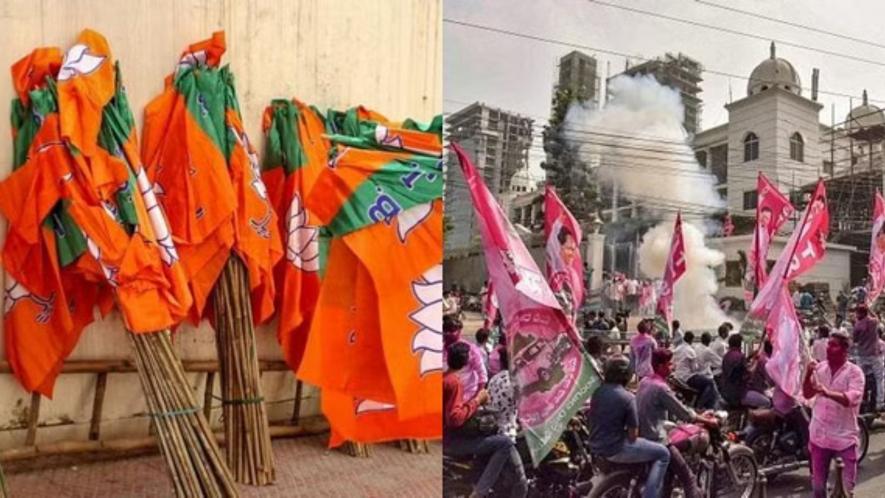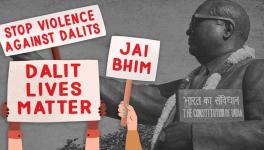Why the BRS and BJP are Declining in Telangana

Image Courtesy: PTI
The Bharatiya Rashtra Samithi (BRS), earlier known as the Telangana Rashtra Samithi (TRS), is witnessing an unprecedented decline in Telangana. If one is to go by the recent exit polls on the Assembly election upcoming in November, it looks like the BRS is out, and the Congress party is in. Even if this poll turns out modestly right, correctly predicting a declining footprint of the BRS in Telangana, we need to look at the reasons closely not only to understand the developments in the state but also to make sense of its impact on the General Election next year.
The separate state of Telangana was formed in 2014, coinciding with the rise of the BJP at the Centre. The BRS, as TRS, won overwhelmingly in the first and second Assembly polls, primarily based on expansive transactional welfarism, regional sentiments, and relief from extreme drought conditions by digging ponds and laying new pipelines for drinking water.
Further, K Chandrashekar Rao, popularly known as KCR, maintained a fair degree of communal harmony and allocated special funds for the Muslims, appointed a Muslim leader as the Deputy Chief Minister and pitched for 12% reservations for the Muslims.
KCR brought in the uniquely conceptualised Rythu Bandhu Scheme that allotted Rs 5,000 per acre to land owners. Later, he extended the scheme as Dalit Bandhu, allotting Rs 10 lakh to Dalit families to begin their own business ventures. KCR also started a Brahmin Parishad, which offered educational loans and support to Brahmin students who wish to pursue higher education abroad. Since Telangana began as a state with a surplus budget, KCR rightly focused on welfare and the relief it brought to most sections in light of the long-drawn experience of suffering abject neglect under the combined state and continued colonial policies of ‘Andhra Capital’.
When his second term began, so did the problems of misgovernance and loss of direction. Though KCR continues with many welfare policies, there is a visible change of mood in Telangana. The state is known for its social protest movements among its majority population (85%), constituted by Dalits, Other Backward Classes (OBCs), Scheduled Tribes and Muslims. All these movements and their social demands merged into the regional demands of Telangana.
KCR delivered on transactional welfarism but stoically neglected aspirational demands such as free schooling from ‘KG to PG’. He neglected higher education as he worried about youth becoming a part of many social mobilisations. There were no appointments of Vice-Chancellors for well over three years in many state universities, and most were starved for funds. The neglect of education was coupled with encouraging caste-based occupations and allotting funds to modernise caste-based occupations. This presented a rather grim picture of the future for many Dalit-Bahujan castes.
KCR offered subsistence welfare but failed to fulfil aspirational imagination. The decline of BRS marks the shift from subsistence relief provided by patronage politics to aspirational politics based on self-respect and greater social equality.
The narrow and casteist vision of KCR was best represented in his persona, which was abrasive, arrogant and non-responsive. KCR rode in as a symbol of protest but manifested nothing but contempt for mass mobilisations in the newly-formed Telangana state. He distanced himself from mass leaders of the independent statehood movement and even got M Kodandaram, now leader of Telangana Jana Samiti (TJS), arrested. Recently, other well-known public faces, such as former professor G Haragopal and others, were framed under the Unlawful Activities (Prevention) Act, leading to protests in various quarters.
Popular memory in Telangana has registered the infamous legend of keeping the famous balladeer Gaddar, who passed away recently, waiting for hours to get an appointment to meet KCR and finally being denied. KCR’s unwarranted arrogance finally culminated in undermining the very same regional sentiments that brought him to power, eventually leading to the change of name of his party. He aspired to make the TRS a national party in the form of BRS to undermine legitimate regional sentiments. This proved suicidal, leading to a loss of emotional connection with regional identity.
It is this space that the Bharatiya Janata Party (BJP) attempted to capture. It tried to communalise the regional imagination. This strategy did not work in Telangana, though it continues to have fair appeal among caste Hindu middle classes. The BJP began to grow with great appeal among the OBCs. It tried to combine social justice with communal polarisation. Under the leadership of Bandi Sanjay Kumar, an OBC from the Munnuru Kapu community, the BJP expanded its footprint in Telangana. But Telangana has remained the land of Reddy domination, as Andhra is of Kamma domination. The central leadership of the BJP has been pursuing the policy of undermining independent leaders in states, taking a cue from the Indira Gandhi brand of politics. It refuses to learn lessons from the pitch to push for complete dependence on the manufactured charisma of Prime Minister Narendra Modi. It also refused to learn from the debacle in the Karnataka Assembly election, where it undermined BS Yediyurappa’s leadership, and it stares at a steep challenge in Rajasthan after undermining the leadership of Vasundhara Raje.
The BJP wants to expand but with Modi as its only popular face. Beyond North and West India, namely in the South and the East, Modi is not a leader with great reach or credibility. With the appointment of G Kishan Reddy (former Minister of State for Home Affairs), the BJP has declined in terms of its popular presence. Pundits, who at one point predicted the possibility of the BJP forming a government, are giving it no more than five seats in the upcoming Assembly election.
In popular opinion, the BJP, BRS and AIMIM are working in tandem to arrest the rise of the Congress party. This has made it a bipolar contest between the Congress and the rest. The Congress has emerged by articulating the new demands and regional aspirations in Telangana. With the recent announcement by Kodandaram that the TJS will work and contest with the Congress party after a meeting with Rahul Gandhi, the Congress has managed to capture more of the protest space in Telangana.
Replicating the experiment in Karnataka, where more than 100 civil society organisations worked independently but with the desire to keep the BJP out, in Telangana, too, over 50 organisations came together under the platform of Telangana Vidya Vanthula Vedika to campaign independently against the misrule of the BRS and danger of the BJP. These organisations have close grassroots connections in various districts.
KCR moved from being the poster boy of Telangana sensibilities and identity to betraying and undermining not only material mobility but psychological and emotional identification. This is akin to the terminal decline of the CPI(M) in West Bengal when it turned its guns against the peasants who were its mainstay. For the moment, the Congress party is increasingly occupying this space and filling the void both because of the favourable role it played in forming a separate state through Sonia Gandhi’s intervention in the past, and with Rahul Gandhi presenting a left-of-centre vision in the present. This shift is happening with scepticism regarding the possibility of a return to the ‘Reddy landlordism’ that Congress represented in the past. If the Congress party maintains its transformative image, symbolism and policy frame, it could look at the long haul—otherwise, people will move on to look for other options.
The author is an associate professor at the Centre for Political Studies, JNU. The views are personal. His new book, Politics, Ethics, Emotions in ‘New India’, was recently published by Routledge.
Get the latest reports & analysis with people's perspective on Protests, movements & deep analytical videos, discussions of the current affairs in your Telegram app. Subscribe to NewsClick's Telegram channel & get Real-Time updates on stories, as they get published on our website.
























